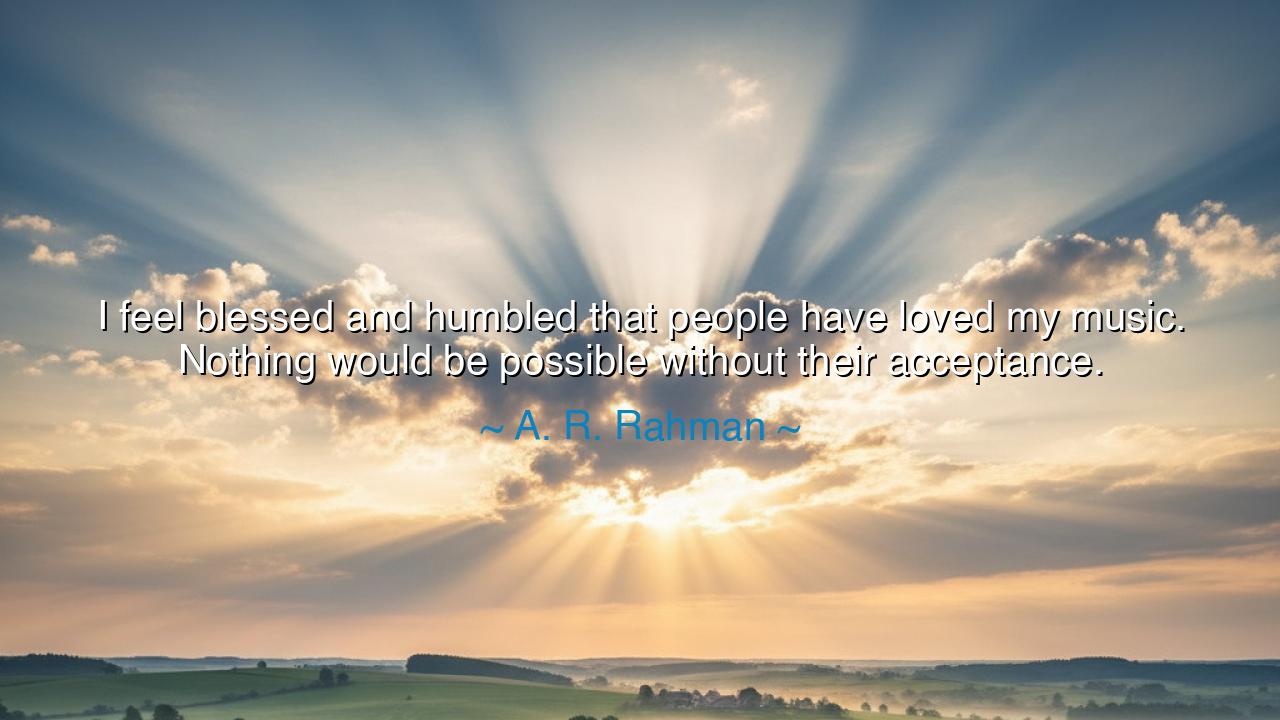
I feel blessed and humbled that people have loved my music.
I feel blessed and humbled that people have loved my music. Nothing would be possible without their acceptance.






A. R. Rahman, the maestro whose notes have touched the hearts of millions, once declared: “I feel blessed and humbled that people have loved my music. Nothing would be possible without their acceptance.” These words, soft and reverent, carry the weight of eternal wisdom. They remind us that the artist, though a vessel of inspiration, is never alone. His work finds meaning not only in its creation but in its reception, in the way it enters the hearts of others and becomes part of their lives. In Rahman’s confession lies the ancient truth: greatness is never a solitary crown but a bond woven between the giver and the receiver.
The ancients knew this as well. The poets of Greece sang not for themselves alone but for the polis, the gathered people whose voices echoed their song. The prophets of Israel cried out not into silence, but to ears that might hear and be changed. In India itself, the bhakti saints poured their devotion into hymns, and their words lived because the people received them as nourishment for the soul. Thus Rahman’s music is not his possession—it is a shared offering, alive only because it is embraced. Without acceptance, even the greatest song falls unheard into emptiness.
Rahman’s own life testifies to this truth. He rose from hardship, from a childhood marked by loss, carrying within him the fire of both faith and determination. When his music first broke into cinema, it was not guaranteed that audiences would embrace its freshness. He blended Indian classical traditions with electronic textures, world rhythms, and spiritual undertones in ways no one had attempted before. It was the acceptance of the people—first in his homeland, then across the globe—that lifted him from obscurity to renown. Without their embrace, the same melodies might have remained unheard, like seeds never given soil.
History too offers parallels. Consider the tale of Van Gogh, the painter who, though filled with vision, died in obscurity, his genius unrecognized in his lifetime. His art was magnificent, but lacking acceptance, he knew only poverty and rejection. Contrast this with Beethoven, who, though deaf in his later years, poured his soul into his symphonies and found his people willing to hear, to honor, to accept. It was this bond of recognition that carried his music into immortality. Rahman, by naming his gratitude, acknowledges that the bridge between artist and audience is the true birthplace of enduring art.
The meaning of his words is thus profound: humility is the foundation of greatness. To be blessed is to recognize that talent alone does not guarantee triumph; to be humbled is to remember that the love of others is what transforms talent into legacy. An artist may create with divine inspiration, but only through the embrace of the people does the work fulfill its destiny. In Rahman’s voice we hear not pride, but gratitude, and this gratitude becomes its own form of greatness.
The lesson for us is clear: in every endeavor, whether in art, work, or life, remember that no one succeeds alone. Behind every triumph stands the acceptance, the support, the encouragement of others. To forget this is to fall into arrogance; to remember it is to walk in humility. And humility, far from diminishing us, elevates us. It keeps us rooted, grateful, and open to continue giving more.
Therefore, let each soul practice this truth. If you succeed, pause to give thanks not only for your own labor, but for those who received, supported, or encouraged you. If you create, remember that your creation lives only when it touches others. And if you follow the path of Rahman, let your heart be filled not with pride, but with reverence for the people who gave your work meaning. For in their love, you find your true reward.
Thus Rahman’s words endure: “I feel blessed and humbled that people have loved my music. Nothing would be possible without their acceptance.” This is not merely an artist’s gratitude; it is the eternal truth of human life. We rise not alone, but together. We are not fulfilled by talent alone, but by the bonds that connect us. And when we remember this, we walk not in vanity, but in harmony—with our art, with our people, and with the divine itself.






AAdministratorAdministrator
Welcome, honored guests. Please leave a comment, we will respond soon